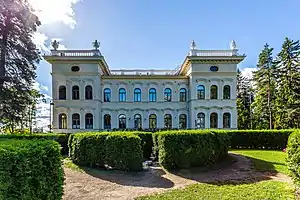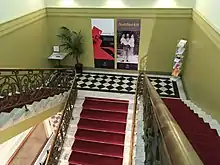Näsilinna
Näsilinna (Finnish: [ˈnæsiˌlinːɑ]; lit. "Näsi Castle") is a neo-baroque palace on Näsikallio in Tampere, Finland. It was built by Peter von Nottbeck, son of Wilhelm von Nottbeck, a St. Petersburg-based industrial manager of Finlayson. The original name of the palace, completed in 1898, was Milavida.[1] The building was designed by architect Karl August Wrede.[2] The true meaning and history of the name Milavida is unknown.[3]

History
.jpg.webp)
The original Milavida, where von Nottbeck's family lived, was a wooden villa built in 1860 next to Näsikallio. However, the whole family did not have time to live in the new Milavida;[2] only the children lived there for a couple of years with the servants.[3] Peter's wife Olga von Nottbeck died while giving birth to twins in Baden-Baden in October 1898, and six months later Peter himself died after caecal surgery at a Parisian hospital. Edvard von Nottbeck,[4] appointed guardian of the children, sold the palace to the city of Tampere in 1905.[2]
The city changed the name of the palace to Näsilinna, and the Häme Museum was opened in 1908, with Gabriel Engberg as the first museum manager. Engberg also lived in Näsilinna.[5] During the Civil War in 1918, the Red Cross Hospital and the Red Guards base operated in Näsilinna,[6] and the building suffered severe damage during the war.[2] During the battle of Tampere, Näsilinna changed in April 3–4 owner three times.[7] About 4,000 rounds of ammunition hit the building. During the Second World War, the building was inhabited by anti-aircraft forces and the bridge guards of the Pori railway.[8]
The palace served as the Häme Museum from 1908 to 1997. Since 1998, the building, closed for 17 years, has been awaiting renovation.[8][3] Näsilinna was renovated in 2013–2015. The total cost of the project was EUR 5 million.[9] The halls on the first floor were restored to the spirit of the original von Nottbeck and included a restaurant with halls, a lobby café and a reception area for the museum. On the second floor, the room division from the 1950s was preserved. This floor was used by the Milavida Museum Exhibition Facilities.[10]
Milavida Museum

The Milavida Museum is a cultural history museum opened in 2015, which operates in Näsilinna. The museum's main exhibition tells the story of von Nottbeck's factory family, which owned Finlayson's cotton mill.[11][12][13]
In addition to the main exhibition, Milavida has changing exhibitions, especially on the themes of fashion and design.[12][14] The museum has seen Salvatore Ferragamo's shoes, Valentino's evening dresses and Timo Sarpaneva's printed fabrics, among others.[15][16][17] In 2018, a crown designed for the King of Finland was on display.[18]
The exhibition spaces are located on the second floor of Näsilinna. The Milavida Museum is smaller than the previous Häme Museum, which was located in the building from 1908 to 1998. Milavida also has its own show profile; it is not a general museum like the Häme Museum.[1][19]
See also
Further reading
- Kyllikki Helenius (2012). Milavida ja Neitsytniemi (in Finnish). Omakustanne.
References
- Lind, Mari: Näsilinnasta Milavidaksi. – Ritva Palo-oja: Hämeen museon historia, p. 171–172. Tampere: Tampereen museot, 2016. ISBN 978-951-609-796-4. (in Finnish)
- Sainio, Sari (June 24, 2011). "Onnettomien tarinoiden palatsi". Aamulehti (in Finnish). p. A13.
- Leinonen, Liisa (January 15, 2015). "Näsilinnasta kuoriutuu pressujen alta Museo Milavida". YLE (in Finnish). Retrieved June 14, 2021.
- Edvard von Nottbeckin passi - AKSELI Tampere (in Finnish)
- Gabriel Engberg – Näköala vuorelta. Niinivaara Seppo, Tampereen taideyhdistys 1988
- "Milavida". Museum Milavida (in Finnish). Retrieved June 14, 2021.
- Sami Suodenjoki: Valkoinen valta Tampereelle - Koskesta voimaa (in Finnish)
- Heinänen, Liisa (March 1, 2013). "Näsilinnaan palaa Tampereen yläluokan ylellinen ympäristö". Aamulehti (in Finnish). p. A05.
- Matson-Mäkelä, Kirsi; Vesanummi, Mari (March 2, 2014). "Vanhan arvotalon remontissa historia löytyy seinistä ja lattioista". YLE (in Finnish). Retrieved June 14, 2021.
- Airo, Tatu (November 13, 2013). "Tällainen Tampereen Näsilinnasta tulee". Aamulehti (in Finnish). p. A08.
- Tampereen kaupunki (in Finnish)
- Matson-Mäkelä, Kirsi (September 13, 2019). "Museo Milavida uudistaa merkittävästä tehtailijasuvusta kertovaa näyttelyään". YLE (in Finnish). Retrieved June 14, 2021.
- Lämsä, Kaisu (January 31, 2019). "Pirkanmaalaisissa museoissa vierailtiin yli 938 000 kertaa". Radio SUN (in Finnish). Retrieved June 14, 2021.
- Poikajärvi, Tähtitalvikki (January 14, 2015). "Museo Milavida avautuu kesäkuussa 2015" (in Finnish). Tampere: City of Tampere. Retrieved June 14, 2021.
- Heikkonen, Aino (September 13, 2015). "Kenkäfriikeille sopiva näyttely avautui Museo Milavidassa". Aviisi (in Finnish). Retrieved June 14, 2021.
- Ala-Korpela, Anu (September 4, 2017). "Valentinon punaista sen olla pitää – ellei ole varaa, aina voi haaveilla". Aamulehti (in Finnish). Retrieved June 14, 2021.
- Rämö, Marjo (April 2, 2019). "Museo Milavida pistää Timo Sarpanevan Ambiente-kankaat esille – Tampereella valmistetut kankaat tekivät vaikutuksen jopa Andy Warholiin". Tamperelainen (in Finnish). Retrieved June 14, 2021.
- Ylitalo, Marko (June 25, 2018). "Suomen kuningashanke meni 1918 aina vain hullummaksi: lopulta monarkiksi kutsuttiin vammautunut saksalaisprinssi Väinö I, joka ei edes halunnut tehtäväänsä ja jonka ulkonäköä suomalaiset kritisoivat". Helsingin Sanomat (in Finnish). Retrieved June 14, 2021.
- Finlaysonin alue (in Finnish). Tampere: Työväenmuseo Werstas. 2019. p. 226. ISBN 978-952-68778-5-3.
External links
- Näsilinna - Official Site (in Finnish)
- Official Site of the Museum Milavida
- Näsilinnasta – VirtualTampere.com (in Finnish)
